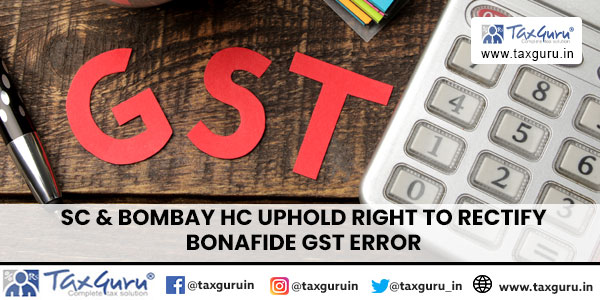Supreme Court & Bombay High Court Uphold Right to Rectify GST Errors: Bonafide Buyers Entitled to ITC Even if Not Reflected in GSTR-2A/2B Due to Supplier’s Mistake – Major Relief to Businesses.
Summary: The Hon’ble Supreme Court of India and the Bombay High Court have reinforced the right of taxpayers to rectify genuine errors in GST filings. In the Bombay High Court case of Aberdare Technologies Pvt Ltd & Anr Vs Central Board of Indirect Taxes & Customs & ors, the petitioner identified clerical errors in GSTR-1 and GSTR-3B submissions but was denied rectification due to procedural limitations. The Court ruled that human errors must be accommodated if no revenue loss is caused, directing authorities to allow rectification via portal or manual submission. Similarly, the Supreme Court dismissed the Revenue’s appeal in Union of India & Ors. Vs. BRIJ Systems Ltd. (SLP (C) Diary No. 6334/2025), upholding the principles of fair taxation. It emphasized that buyers should not lose Input Tax Credit (ITC) due to supplier errors when tax has already been paid to the government. Both rulings mandate procedural fairness, recommend reevaluating rectification timelines under Sections 37(3) and 39(9) of the CGST Act, and acknowledge that procedural errors should not override substantive compliance. These judgments underscore the GST regime’s maturing framework and ensure businesses are not penalized for clerical mistakes, provided there is no revenue impact.

Introduction: In a series of landmark rulings, the Hon’ble Supreme Court of India and the Bombay High Court have delivered much-needed clarity and relief to taxpayers under the Goods and Services Tax (GST) regime. These decisions reinforce the principle that human errors in GST filings, particularly in GSTR-1 and GSTR-3B, should not result in denial of Input Tax Credit (ITC), especially when there is no loss of revenue to the exchequer. The rulings uphold the fundamental right of businesses to correct genuine clerical or arithmetical mistakes.
1. Bombay High Court Judgment: Aberdare Technologies Pvt. Ltd. & Another Vs. CBIC & Others [W.P. No. 7912 of 2024]
Date of Order: July 29, 2024
Court: Bombay High Court
Petitioner: Aberdare Technologies Pvt. Ltd.
Respondents: CBIC & Others
Key Highlights:
- The petitioner filed GSTR returns in time but later, in December 2023, realized that there were clerical errors.
- The petitioner sought permission from the department to rectify the errors, but the request was declined citing the limitation period under Section 39(9) of the CGST Act.
- The Court referred to its earlier judgment in Star Engineers (I) Pvt. Ltd. Vs. Union of India (2023) which had held that if there is no loss to revenue, rectification should be allowed.
- The department was directed to either open the portal for amending GSTR-1 and GSTR-3B or accept manual rectification.
Court’s Observations:
- Section 37(3) and Section 39(9) must be interpreted purposively, allowing rectification of genuine errors.
- Denial of rectification for minor errors would result in incorrect GST records becoming sacrosanct.
- Human errors must be accepted as inevitable, and rectification should be allowed especially where no revenue loss is involved.
- The GST regime is based on self-reporting and electronic filings; hence, procedural fairness is critical.
Order Summary:
- Respondents were ordered to allow rectification within one week of order upload.
- If the portal is not functional, the taxpayer may file a manual request.
- If the authorities wish to reject the request, they must provide a notice and personal hearing.
2. Supreme Court Judgment: Union of India & Ors. Vs. BRIJ Systems Ltd. & Ors. [SLP (C) Diary No. 6334/2025]
Date of Order: March 24, 2025
Court: Supreme Court of India
Key Highlights:
- The Supreme Court dismissed the Revenue’s SLP, reinforcing the Bombay HC ruling in Aberdare Technologies.
- Recognized the right to rectify clerical and arithmetical errors as a fundamental right of business.
- Directed the Central Board of Indirect Taxes and Customs (CBIC) to re-examine timelines for such rectifications.
Court’s Observations:
- Mistakes are not uncommon in tax filings, particularly when made online.
- Tax already paid to the government should not be denied as ITC to the buyer due to the supplier’s error.
- Revenue authorities should adopt a fair and facilitative approach, especially when no loss to the government is demonstrated.
- Software limitations or procedural lapses should not defeat legitimate taxpayer rights.
- The Court appointed Mr. Arvind P. Datar, Senior Advocate, as Amicus Curiae to assist in ongoing matters of similar nature.
Implications of the Judgment:
- This judgment sets a binding precedent protecting businesses from disproportionate consequences due to clerical mistakes.
- Mandates a reconsideration of strict deadlines for rectification under Sections 37(3) and 39(9) of the CGST Act.
- Recognizes that errors in filing are inevitable and often not intentional.
- Acknowledges that errors affect not just the taxpayer, but also the rightful ITC of buyers.
Legal Takeaways for Taxpayers:
- Businesses have a right to seek rectification of inadvertent errors.
- ITC cannot be denied to recipients where tax is duly paid to the government.
- Technical restrictions (such as portal lock-ins) cannot override substantive tax compliance.
- Departments are bound to consider representations and offer personal hearings before denying rectification.
- Manual rectification is permissible where system limitations exist.
Conclusion: The Bombay High Court and Supreme Court have laid a robust foundation for protecting taxpayers’ rights in the GST regime. These rulings uphold the core tenets of natural justice, substantive compliance, and fair taxation. Departments are urged to avoid hyper-technicality and allow legitimate claims of ITC when errors are shown to be bona fide and when there is no loss to revenue. These developments signal a maturing GST framework that is more aligned with taxpayer facilitation and justice.
***
Prepared By: Dr. Muhammed Mustafa C T | BRQ Associates – Tax & Legal Research Team





